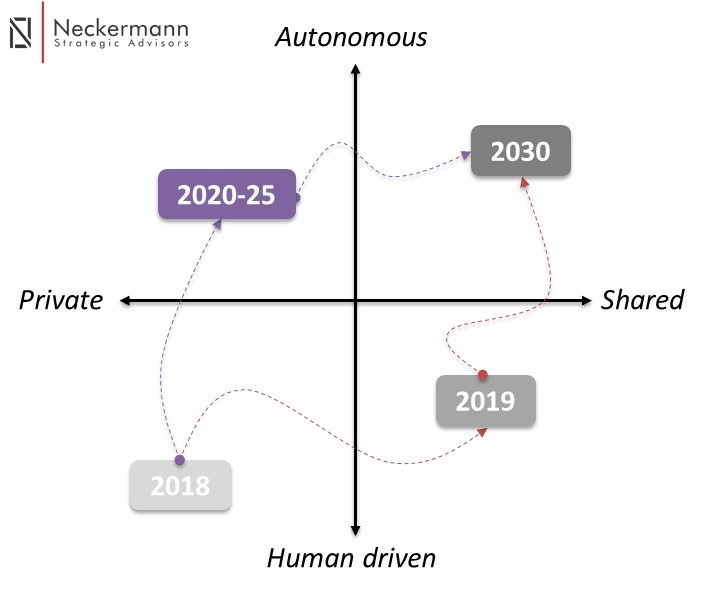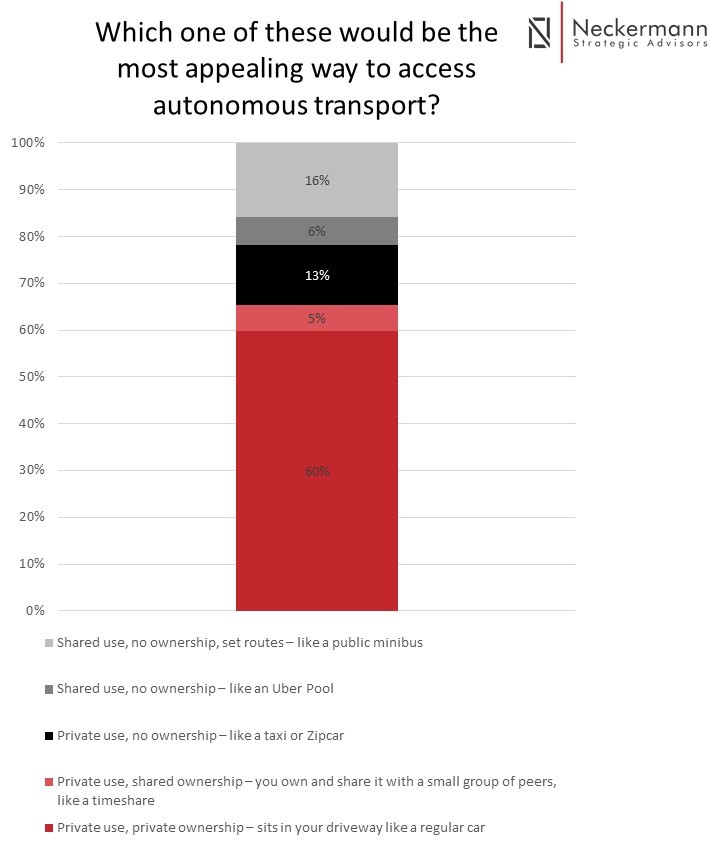
Is shared autonomy a ‘double-leap’ too great to accept? For most people, giving up both the steering wheel and private ownership of their own vehicle represents not one, but two significant steps. This groundbreaking study illustrates current issues with the adoption of shared, autonomous mobility, and suggests steps forward for the community.
The Neckermann Matrix on the road to shared autonomous mobility shows two leaps of faith: a transition from private, human-driven transport, to shared, autonomous mobility needs to pass through phases of shared mobility, and a phase of autonomous mobility, but taking both steps at the same time poses a challenge for human acceptance.

With this in mind, we developed a piece of research, commissioned a survey with 3,000 participants in the UK, and conducted over 25 interviews around the world with governing bodies, academics, engineers, and practitioners, in order to refocus the debate on people and their readiness to embrace the MobilityRevolution™. The results of our research were published by Matador Business Press, and featured in countless magazines and publications.
One of the research findings is it could be at least 10 years before autonomous vehicles, and the sharing of them will become part and parcel of society. This contrasts dramatically with the suggestions of some in the AV community proposing autonomous service before 2022. Combined with a perceived lack of prestige in not owning a vehicle, we found that the majority of today’s motorists aren’t yet ready for certain aspects on the future of mobility. Indeed, the survey – performed by our partner 7th Sense – suggests that over 60% of the respondents are not willing to share an AV and a vast majority of over 75% of respondents declared themselves uncomfortable with driverless technology.

Lukas Neckermann, Managing Director of Neckermann Strategic Advisors and co-author of the study adds, “Consumers need to be inspired by the benefits of AVs instead of being flummoxed by the technology. The promise of enhanced journey safety, convenience and dependability is much more compelling than endless discussions on the trolley-problem and number of miles driven in autonomous mode.”
Another study takeaway highlights that an increased communication of the benefits of AVs is vital to combat the fear of the unknown and inspire the greater level of trust required for widespread end-user acceptance. There is an urgent need to switch the dialogue from technology to safety and quality. Neckermann suggests, “It’s time to engage more with the consumer.”

Frederic John, co-author of the study and consultant at Neckermann Strategic Advisors, said: “We understood from our interviewees that there’s a desire from autonomous players to create a neutral supra-organisational body backed by officials and academics to organise this nascent industry. First, there’s an opportunity to coordinate the internal industry relationships between players to share concerns, failures but also successes. Collaboration and open-mindedness are for me key factors to make the Mobility Revolution™ and the autonomous vehicle industry a success. Second, there’s an industry need to have a single, unified and strong voice to promote autonomous mobility technology towards the public and generate future end-user engagement. We look forward to engaging with partners from around the industry to build this strong community.”
If you are interested in this study, want to explore our findings and engage to build this AV community, please feel free contact us: threezeroes@neckermann.net
The results of this study have led to the creation of PAVE Europe, and PAVE UK – not-for-profit organisations dedicated to education and communication of highly automated vehicles. Details to the follow-up study, conducted in 2023 can be found here.
This study has been featured in Forbes, TU automotive, MotorFinance, FleetNews, YahooNews, Insurance Edge and countless other publications.
